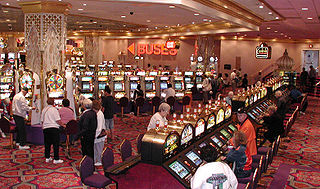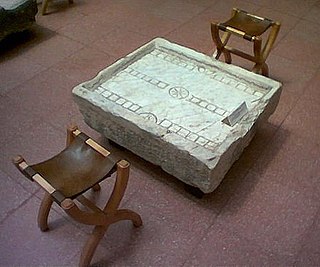
Gambling is the wagering of something of value on an event with an uncertain outcome with the intent of winning something else of value. Gambling thus requires three elements to be present: consideration, risk (chance), and a prize. The outcome of the wager is often immediate, such as a single roll of dice, a spin of a roulette wheel, or a horse crossing the finish line, but longer time frames are also common, allowing wagers on the outcome of a future sports contest or even an entire sports season.

A bookmaker, bookie, or turf accountant is an organization or a person that accepts and pays off bets on sporting and other events at agreed-upon odds.

Gambling in Macau has been legal since the 1850s when the Portuguese government legalised the activity in the autonomous colony. Since then, Macau has become known worldwide as the "Gambling capital of the world" or "Monte Carlo of the East".
Online poker is the game of poker played over the Internet. It has been partly responsible for a huge increase in the number of poker players worldwide. Christiansen Capital Advisors stated online poker revenues grew from $82.7 million in 2001 to $2.4 billion in 2005, while a survey carried out by DrKW and Global Betting and Gaming Consultants asserted online poker revenues in 2004 were at $1.4 billion. In a testimony before the United States Senate regarding Internet Gaming, Grant Eve, a Certified Public Accountant representing the US Accounting Firm Joseph Eve, Certified Public Accountants, estimated that one in every four dollars gambled is gambled online.
Online casinos, also known as virtual casinos or Internet casinos, are online versions of traditional casinos. Online casinos enable gamblers to play and wager on casino games through the Internet. It is a prolific form of online gambling.
Online gambling is any kind of gambling conducted on the internet. This includes virtual poker, casinos and sports betting. The first online gambling venue opened to the general public, was ticketing for the Liechtenstein International Lottery in October 1994. Today the market is worth around $40 billion globally each year, according to various estimates.

Gambling in the United States is legally restricted. In 2008, gambling activities generated gross revenues of $92.27 billion in the United States.

The British Columbia Lottery Corporation is a Canadian Crown corporation offering a range of gambling products including lottery tickets, casinos and legal online gambling. It is based in Kamloops, with a secondary office in Vancouver. It consists of three business units, Lottery, Casino and eGaming; and five support divisions, Human Resources, Information Technology, Compliance & Security, Finance, and Communications. Its annual revenues exceed CDN $3.1 billion. It has 890 direct employees. Its service providers, who run casinos on its behalf under contract, have an additional 8,300 employees.
Gambling in India varies by state as states in India are entitled to formulate their own laws for gambling activities. Some states like Goa have legalised casinos. Common gambling activities like organized betting is restricted except for selective categories including lottery and horse racing.

The Isle of Man Gambling Supervision Commission is the Gaming Control Board of the Isle of Man. It regulates most forms of gambling in its territory including land based and online gambling services.

Gambling in Russia is legal in four regional subject areas, and in 2009 was made illegal in all other areas of Russia.
Gambling in Ukraine was illegal between 2009 and 2020.

Gambling in Italy has existed for centuries and has taken on many forms. Its dates back to the days of the Roman Empire, when the predecessor of the modern game of backgammon, Ludus Duodecim Scriptorum, became popular among Roman legionnaires. It is also due to them that the game came to other European countries.
Gambling in Estonia is relatively young. While Estonia was a part of the USSR, all types of gambling activities were banned. Despite the prohibition, illegal casinos still functioned, but the real history of gambling started in 1994-1995 when the first Lottery Act of 1994 and the first Gambling Act of 1995 came into power. As the capitol, Tallinn has more casinos than any other Estonian town. As of September 2010, there were 33 casinos in Tallinn. That's 3 times less than in 2008, when 91 gambling venues operated in this city. According to experts, the main reasons for such decrease were the consequences of the crisis and the adoption of the new gambling law in 2008. The legal age for playing at casinos is 21.
Gambling in the Philippines has been present in the country since at least the sixteenth century. Various legal and illegal forms of gambling are found almost all over the archipelago. The government manages gambling through the Philippine Amusement and Gaming Corporation (PAGCOR) a state-owned enterprise which both operates a number of individual casinos and in turn acts as a regulator to privately owned casino operators. Since 2016 PAGCOR has also granted operating licenses and overseen the regulation of growing online gambling sector serving offshore markets. Casino gambling and integrated resorts have become a key component of the Philippines appeal as a tourist destination with more than twenty casinos found in Metro Manila alone.
The gambling age is the minimum age at which one can legally gamble in a certain jurisdiction. In some countries, gambling is illegal regardless of age, while some countries have different age limits for different types of gambling, and some countries have no explicit minimum gambling age.

Gambling in Metro Manila has been regulated since 1976 when the Philippine Amusement and Gaming Corporation (PAGCOR) was created through Presidential Decree 1067. Under its charter promulgated in 1983, the 100% state-owned PAGCOR, running under the direct supervision of the Office of the President, serves three crucial roles: to regulate and operate all games of chance in the country, particularly casino gaming; generate funds for the government's infrastructure and socio-civic projects; and boost local tourism.

Gambling in Cambodia is officially illegal under the 1996 Law on Suppression of Gambling, which outlawed all unauthorized forms of gambling and provided for penalties ranging from monetary fines to short prison sentences, although the Cambodian government's General Department of Prisons does not list gambling as one of the 28 offenses punishable by imprisonment.
Gambling in Nigeria is not well regulated. Although there is a gambling law in place, many illegal casinos operate in the country. The legal land-based casinos are located in the two largest cities. The biggest casino is The Federal Palace Hotel in Lagos. Nigerian law focuses on activities to reduce money laundering and illegal gambling.

The Malta Gaming Authority (MGA) (LGA) is the gaming control board of Malta. It regulates most forms of gambling in its territory, including both land-based and online gambling services including B2C and B2B services.










